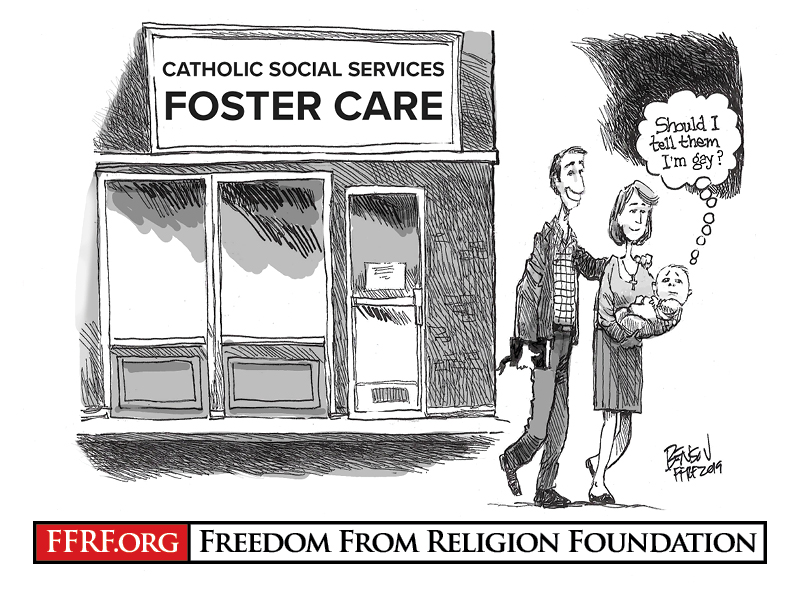
The U.S. Supreme Court exhibited worrisome signs today during oral arguments in a major case involving a Catholic group that’s seeking to discriminate while participating in a government foster care program.
In Fulton v. City of Philadelphia, the conservative 6-3 majority on the Supreme Court indicated that it may upend the city’s nondiscrimination rules in favor of religion.
“The Supreme Court’s handling of this case is troubling and it signals an intent by some on the court to have religion trump the civil rights of LGBTQ citizens,” says FFRF Co-President Annie Laurie Gaylor.
Catholic Social Services sued Philadelphia after the city stopped contracting with the organization for foster care screening services. The group had said it would refuse to work with same-sex couples, which violates the city’s contracts and anti-discrimination policy. Catholic Social Services lost in its legal quest before both the district court and the 3rd U.S. Circuit Court of Appeals. However, some conservative justices on the Supreme Court seemed ready to rule that religion is a special license to discriminate.
A recurrent theme in the court’s questioning concerned whether discrimination on the basis of sexual orientation was somehow different than other forms of discriminaton, such as on racial grounds. Justice Samuel Alito asked the counsel for the federal government, “Didn’t the court say [in Obergefell] that there are honorable and respectable reasons to continue to oppose same-sex marriage? Would the court say the same thing about interracial marriage?”
Justice Elena Kagan, who aligns with liberal justices, followed up on this line of argument and asked, “Do you think it is a compelling state interest to want to eradicate discrimination against gays and lesbians?” The attorney for the federal government struggled to answer. He replied, in part, “In the abstract, perhaps.”
“There seems to be an inherent belief by those defending discrimination against same-sex couples that it is somehow a lesser and permissible form of discrimination,” says FFRF Senior Counsel Patrick Elliott. “This position is neither honorable nor respectable, as discirmination is wrong regardless of whether it is religiously motivated.”
Justice Brett Kavanaugh signaled his strong disagreement with the city of Philadelphia’s policy of nondiscrimination in foster care services. He discussed a “balance” between the rights of same-sex couples and religious beliefs, noting language from the court’s prior decisions on the issue. Kavanaugh then criticized the city, saying, “[W]hat I fear here is that the absolutist and extreme position that you’re articulating would require us to go back on the promise of respect for religious believers.”
This is the first week that Justice Amy Coney Barrett has joined arguments before the court. She asked one of the attorneys a hypothetical where a government entered into contracts with all hospitals and required that “every hospital has to perform abortions.” She questioned whether the government would be exercising its licensing authority in that instance or whether the hospital would be contracting for a government service. (View the full FFRF report on Barrett at ffrf.us/barrett ).
FFRF filed an amicus brief in the case, strongly opposing the contention of Catholic Social Services that it can discriminate as a government contractor. “If CSS is permitted to discriminate in this case, the rights of religious minorities and the nonreligious would be put in peril,” FFRF observed in its brief.
Hopefully, the Supreme Court will keep that in mind while handing down its decision.
The Freedom From Religion Foundation is the largest national association of freethinkers, representing atheists, agnostics, and others who form their opinions about religion based on reason, rather than faith, tradition, or authority. Founded nationally in 1978 as a 501(c)(3) nonprofit, FFRF has more than 33,000 members, including members in every state and the District of Columbia.

